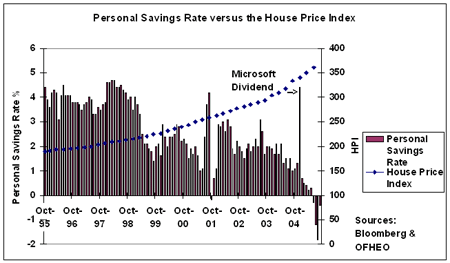Americans are now collectively a nation of spenders, not savers. According to the Personal Savings Rate index that is tracked by the Bureau of Economic Analysis, the US personal savings rate as a percentage of disposable personal income has fallen to -0.4% as of September 2005 meaning that we are spending more than we earn.

One reason for the negative savings rate is the housing wealth effect. The national savings rate is tied in part to the housing market as well as to the success of other investments such as stocks. Housing price increases over the last few years have caused households to accumulate housing wealth but lose other forms of wealth according to a November 2005 study by Baker and Rosnick (1). Consumers spend 4-6 cents of every dollar of housing equity they gain. If house prices continue to outpace inflation, the national savings rate could decline even further.
How Does This Phenomenon Affect Credit Unions?
This dynamic is evident on credit unions balance sheets. Share growth has fallen to a 10-year low at 4.2%, and loan growth has risen to 10.2% as of June 2005. As a consequence, the loan-to-share ratio has reached 75.9%, its highest point since 2000. Somecredit unions have been forced to borrow money to maintain sufficient liquidity levels, and are searching for new share growth opportunities in light of a negative national savings rate.
Case Study: First Entertainment Credit Union ($566 million in assets, Hollywood, CA)
First Entertainment has been innovative in reacting to a declining national savings rate. Specifically, it prices its share certificate rates 3-6 months ahead of the market. Its share pricing strategy is to blow away the local competition, according toRoy MacKinnon, vice president of marketing. On April Fools Day, it began offering a 12-month certificate at 4.01%, significantly higher than what was then available in its local market. As a result, the credit union received $5 million in no time.
The credit union also introduced an 18-month CD for a 30-day period that was priced at a 3-year equivalent rate.We initially targeted members with CDs that were maturing in the next six months and let them move the money over without penalty,said MacKinnon.
At the same time, housing prices in California have grown 25.2% in the 12-month period ending June 30, 2005, according to the Office of Federal Housing Enterprise Oversight.There still are a lot of prospective buyers in the market even at theseprices, and there are not sufficient homes to meet the demand, said CEO Chuck Bruen. First Entertainment decided to proactively attract new deposits to fund its 21.0% loan growth through September 30, 2005.We could afford to offerour rate specials and thought it was better to offer them to our members rather than watch the money leave our institution as the certificates matured, commented MacKinnon.
While most credit unions offer competitive rates when compared to their local competition, few price them as aggressively as First Entertainment.Our members respond primarily to rates and not to other one-time incentives, said MacKinnon.As a result of its pricing and marketing strategies, First Entertainment Credit Union has grown its share certificates 54.2% and its overall shares 9.4% in the 12 months ending September 30, 2005.